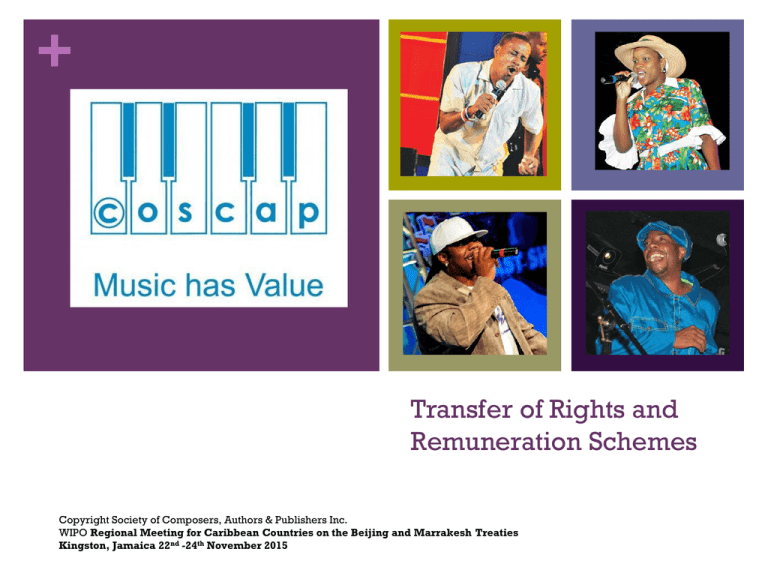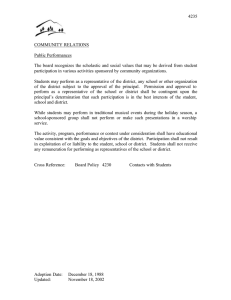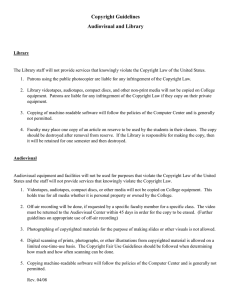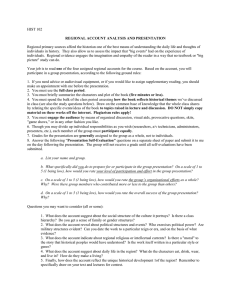Transfer of Rights and Remuneration Schemes
advertisement

+ Transfer of Rights and Remuneration Schemes Copyright Society of Composers, Authors & Publishers Inc. WIPO Regional Meeting for Caribbean Countries on the Beijing and Marrakesh Treaties Kingston, Jamaica 22nd -24th November 2015 + Introduction The Copyright Society of Composers, Authors & Publishers Incorporated (COSCAP) is a Barbados based collective management organization which represents approximately 1,200 local rights holders. These are the songwriters, publishers, performers and producers of musical works, performances and recordings. www.coscap.org Regionally, COSCAP is a member of the Association of Caribbean Copyright Societies (ACCS) – www.accscaribbean.com. Internationally COSCAP is a member of the CISAC, IFPI and FILAIE Transfer of Rights & + Remuneration Schemes Beijing Treaty - A treaty on audiovisual performances which: “develop and maintain the protection of the rights of performers in a manner as effective and uniform as possible.” Takes into consideration the WIPO Development Agenda Recognises the need to introduce new international rules in order to provide adequate solutions to the questions raised by economic, social, cultural and technological developments…. Transfer of Rights & + Remuneration Schemes This Treaty has no connection with other treaties except the WPPT and does not prejudice any rights and obligations under any other treaties Performers are those who perform a work (including those in the public domain) or folklore but does not include “extras” - It is understood that the definition of "performers" includes those who perform a literary or artistic work that is created or first fixed in the course of a performance – improvisation (Agreed statement concerning Article 2a). Transfer of Rights & + Remuneration Schemes Does not provide exclusive rights to audiovisual producers …. Protection is provided for “audiovisual fixations of unfixed performances”. However, it is important to understand the relationship with phonograms Confirmed that the definition of "audiovisual fixation" contained in Article 2(b) is without prejudice to Article 2(c) of the WPPT. Transfer of Rights & + Remuneration Schemes “phonogram” means the fixation of the sounds of a performance or of other sounds, or of a representation of sounds, other than in the form of a fixation incorporated in a cinematographic or other audiovisual work;” The result is that where a commercial phonogram is embodied in an audiovisual product there is a right to equitable remuneration under Article 15 of the WPPT for the broadcast and communication to the public of the audiovisual product. Transfer of Rights & + Remuneration Schemes Art. 4 – National Treatment A Contracting Party shall be entitled to limit the extent and term of the protection accorded nationals of another Contracting Party …with respect to the rights granted in Article 11(i) and 11(2) (broadcasting, communication to the public) …to those rights that its own nationals enjoy in that other Contracting Party. Any Contracting Party may declare that it will apply the provisions of para (1) or (2) only in respect of certain uses or that it will limit their application in some other way or that it will not apply the provisions of paragraphs (1) and (2) at all. Transfer of Rights & + Remuneration Schemes Article 6 – Economic Rights of Performers in their Unfixed Performances Performers are granted the exclusive right of authorizing as regards their performances: The broadcasting and communication to the public of their unfixed performances except where the performance is already a broadcast performance The fixation of their unfixed performance Transfer of Rights & + Remuneration Schemes Article 7 – Right of reproduction Performers shall enjoy the exclusive right of authorizing the direct or indirect reproduction of their performances fixed in audiovisual fixations, in any manner or form. Transfer of Rights & + Remuneration Schemes Article 8 – Right of Distribution Performers shall enjoy the exclusive right of authorizing the making available to the public of the original and copies of their performances fixed in audiovisual fixations through sale or other transfer of ownership There is the possibility of exhaustion at the national level after the first sale or other transfer of ownership of the original or a copy of the fixed performance with the authorization of the performer. Transfer of Rights & + Remuneration Schemes Article 9 - Right of Rental Performers shall enjoy the exclusive right of authorizing the commercial rental to the public of the original and copies of their performances in audiovisual fixations as determined in the national law of the Contracting Parties, even after the distribution of them by, or pursuant to, authorization by the performer. There is no provision for equitable remuneration for commercial rental. Transfer of Rights & + Remuneration Schemes Article 10 – Right of Making Available of Fixed Performances Performers have the exclusive right of authorizing the making available to the public of their performances fixed in audiovisual fixations, by wire or wireless means, in such a way that members of the public may access them from a place and at a time individually chosen by them. Transfer of Rights & + Remuneration Schemes Article 11 – Right of Broadcasting and Communication to the Public Performers enjoy the exclusive right of authorizing the broadcasting and communication to the public of their performances fixed in audiovisual fixations. However, Contracting Parties may through the deposit of a notification instead establish a right to equitable remuneration for the direct or indirect use of performance fixed in audiovisual fixations for broadcasting or for communication to the public. Transfer of Rights & + Remuneration Schemes The Contracting Parties are also able to set conditions in their legislation for the exercise of the right to equitable remuneration. The BTAP offers: Exclusive yet transferable rights Protection But through equitable remuneration + Transfer of Rights & Remuneration Schemes + Transfer of Rights & Remuneration Schemes Article 19 of the Rome Convention (“….once a performer has consented to the incorporation of his performance in a visual or audio-visual fixation, article 7 Minimum Protection for Performers, shall have no further application”) does not limit the performers’ freedom to negotiate contracts when they authorize the audiovisual fixation of their performances, nor their right to benefit from national treatment under the BTAP. + Transfer of Rights & Remuneration Schemes Article 12 – Transfer of Rights A Contracting Party may provide that once a performer has consented to fixation of his/her performance in an audiovisual fixation, the exclusive rights of authorization provided under Articles 7-11, shall be owned or exercised by or transferred to the producer of the audiovisual fixation subject to any contract to the contrary between the performer and the producer of the audiovisual fixation as determined by the national law. + Transfer of Rights & Remuneration Schemes Articles 12(1) and 12(2) authorize contracting countries to decide whether performers’ rights are initially owned by the producer and Article 12(3) declares that contracting countries may additionally provide audiovisual performers with equitable remuneration for the making available to the public, broadcasting and communication to public of their audiovisual performance. + The BTAP, the Caribbean and Development of a Regional Audiovisual Sector Although there has been some international success with Caribbean audiovisual products (films), the film/audiovisual sector is still quite nascent. There are no strategically developed business models in terms of the issue of rights management rather, there has been the attempted adaptation/adoption of the American model. + The BTAP, the Caribbean and Development of a Regional Audiovisual Sector + The BTAP, the Caribbean and Development of a Regional Audiovisual It is important to recognise that there are a number of trade practices/business models within the global AV industry. E.g.Most European countries explicitly recognize the rights of audiovisual performers and there is a statutory mechanism which provides audiovisual performers with a right of equitable remuneration (often this cannot be waived) for broadcasting and/or communication to the public. + The BTAP, the Caribbean and Development of a Regional Audiovisual The most important AV market for the Caribbean, the USA operates very specifically and in considering how the BTAP can be used a tool to develop the regional AV sector it will be necessary to also to give careful consideration to the type of business model(s) which will best serve the region’s interest. + The BTAP, the Caribbean and Development of a Regional Audiovisual Sector In the USA collective agreements are used for the payment of residuals for the use of audiovisual works. This obligation is a contractual one between the producers and performers. It does not concern third parties such as broadcasters. There is no collective rights management system for audiovisual performers. + This right of equitable remuneration does not exist in the USA. The BTAP, the Caribbean and Development of a Regional Audiovisual Sector In the US the rights provided to performers under copyright law are transferred to the producer. There are no specific distinct AV performers’ rights. The US claims compliance with the BTAP through the its copyright legislation and therefore with no equitable remuneration as specific in the BTAP…… + Would US producers still be entitled to national treatment/reciprocity? The BTAP, the Caribbean and Development of a Regional Audiovisual Sector Bearing in mind that: Countries which have an equitable remuneration scheme for performers would (where there is reciprocity recognised) have to share equitable remuneration even where the rights have transferred to producers. + The BTAP, the Caribbean and Development of a Regional Audiovisual Sector Whilst CARICOM nations particularly after voicing the desire to develop the creative industries and specifically the AV sector, should ratify the BTAP it is recommended that: 1. There is a clear understanding of how the sector operates locally/regionally 2. An understanding of what guiding/corrective measures would be useful? + The BTAP, the Caribbean and Development of a Regional Audiovisual Sector An understanding of what would be the best approach in terms of remuneration schemes and how these are managed. + Erica K. Smith CEO COSCAP #11, 8th Avenue, Belleville St. Michael Barbados BB11114 Tel: 12464351777 Fax: 12454352777 Email: erica@coscap.org www.coscap.org






